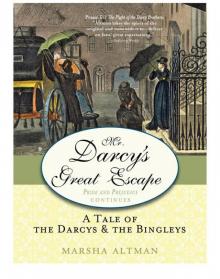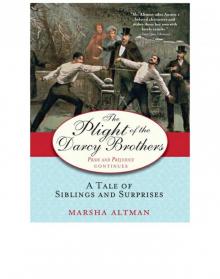- Home
- Marsha Altman
The Ballad of Gregoire Darcy
The Ballad of Gregoire Darcy Read online
Table of Contents
Title Page
Epigraph
Introduction
Family Tree
CHAPTER 1 - The Miracle Worker
CHAPTER 2 - Bride and Prejudice
CHAPTER 3 - To the Ends of the Earth
CHAPTER 4 - The Scholars
CHAPTER 5 - The Infamous George Wickham
CHAPTER 6 - The Newly weds
CHAPTER 7 - The Protégé
CHAPTER 8 - Primate Concern
CHAPTER 9 - A Long-Expected Party
CHAPTER 10 - Ghost in the Chapel
CHAPTER 11 - The Discipline of St. Benedict
CHAPTER 12 - Grégoire’s Cousins
CHAPTER 13 - Broken Floor, Broken Man
CHAPTER 14 - “To Forgive, Divine”
CHAPTER 15 - The Abbot’s Epistle
CHAPTER 16 - Demons in the Night
CHAPTER 17 - The Adventures of Mugin-san
CHAPTER 18 - Mary’s Season
CHAPTER 19 - His Royal Highness
CHAPTER 20 - The Noncourtship
CHAPTER 21 - The Letter from the Island
CHAPTER 22 - A Matter of Propriety
CHAPTER 23 - More Notes from the Underground
CHAPTER 24 - Joseph Bennet’s Proposal
CHAPTER 25 - The Last Bennet Girl
CHAPTER 26 - A Sight for Sore Eyes
CHAPTER 27 - Saint in a Box
CHAPTER 28 - Missives from Ireland
CHAPTER 29 - Sacred Sacraments
CHAPTER 30 - Intruder
CHAPTER 31 - The Unmentionable Thing
CHAPTER 32 - The Business at Hand
CHAPTER 33 - The Promise
CHAPTER 34 - Mourners
CHAPTER 35 - English Gentlefolk
CHAPTER 36 - The Dress
CHAPTER 37 - The Princess
CHAPTER 38 - The Knight
CHAPTER 39 - One Year Later
Historical Notations
Bibliography
Acknowledgements
Other Ulysses Press Books
About the Author
Copyright Page
When I was a little kid playing with my toys in the den,
my grandmother, Helga Franklin, sat down with me and I
proceeded to explain to her the complex backstories of all
of my assorted action figures in great detail.
“Marsha, how do you come up with all these stories?”
she asked me. I’ve never been able to answer her.
This is for you, Grandma. It’ll have to do.
“Everybody likes to go their own way—to choose their own time and manner of devotion.”
JANE AUSTEN (1775 – 1817), MANSFIELD PARK
Introduction
WELCOME, READERS! Quite a bit has happened in the world of the Darcys and the Bingleys since Jane Austen left off with them, so let’s do some summaries to help everyone catch up.
After their most joyous coming together in Pride and Prejudice, Elizabeth Bennet married Mr. Darcy (of Mr. Darcy fame), and her older sister Jane Bennet married Mr. Bingley (of Darcy’s friend fame). Seriously, if you’re a little foggy on your Pride and Prejudice, I suggest some freshening up. At least rent the movie or something. Anyway, the Darcys and the Bingleys proceeded to have a whole mess of kids. (Fortunately, not all at the same time.) The Darcys’ oldest child is Geoffrey Darcy, and the Bingleys’ oldest child is Georgiana Bingley.
Caroline Bingley, Charles’s unwed sister, became involved with a Scottish earl, who then turned out to be a rake, and by that I mean a nineteenth-century scoundrel and not a gardening tool. This was all exposed in time for her to also reveal she was actually in love with the impoverished Dr. Daniel Maddox. Dr. Maddox lost his social standing when his older brother Brian gambled away their family fortune. After some sword fighting and the bad guy getting clobbered with a candlestick, Dr. Maddox and Caroline Bingley were married.
Mary Bennet, Jane and Elizabeth’s unmarried sister, returned from studying in France and brought the news that she was with child, the father being an Italian seminary student. Darcy and Elizabeth traveled through Europe to find him, on the way discovering that Darcy had an illegitimate half-brother named Grégoire Bellamont-Darcy holed up in a French monastery. Mary’s wouldbe suitor was found and he offered her a settlement. Mary had a son, Joseph, and is currently unmarried and living with her parents. Darcy also discovered that George Wickham (the villain in Pride and Prejudice who seduced and married Lydia Bennet, the youngest Bennet sister) was also his half-brother. Their family reunion went the worst possible way, with fratricide and a complete lack of potato salad. Lydia got over her husband’s death rather quickly but was left with two children, George and Isabella Wickham. Brother Grégoire, still a monk, went to live in Austria. Dr. Maddox and Caroline Bingley had a daughter, but also adopted a son—the bastard child of the Prince Regent and a prostitute—named Frederick (the son, not the prostitute).
(There will not be a test. Just so you know.)
When Napoleon invaded Russia in the tumult of war, Darcy lost track of his brother, Grégoire, and Dr. Maddox lost track of his brother, Brian, who was supposed to have married a Transylvanian princess but then disappeared. The two of them traveled to Austria to find them, but ended up in a Transylvanian dungeon as hostages, and their wives ended up rescuing them after locating Grégoire. Brian Maddox and his wife, Princess Nadezhda, reappeared after being missing for two years, having taken the long way home to England via Russia and Japan. So it turned out they had been fine all along. No one was thrilled to hear that the happy couple had been so thoughtless. They brought with them a mixed-race Japanese convict named Mugin, whom I only mention because he pops up from time to time.
Lydia Bennet remarried and had a whole mess of kids with her new husband, Mr. Bradley. Kitty Bennet, the last remaining Bennet sister to be mentioned, got married to a Mr. Townsend, a story really not worth going into because she isn’t a very interesting character so I don’t like to spend a lot of time with her.
After the war, Grégoire Bellamont-Darcy moved to Spain, his previous monastery having been dissolved by Napoleon.
There is also a Bavarian saint named Sebald buried in Darcy’s graveyard instead of his traditional home in Nuremburg, but there’s a long story behind that, so just take it for what it is.
Marsha Altman
New York, NY
2011
Family Tree
Bold face indicates living, italics indicates deceased.
THE DARCYS
Henry Darcy
(with unnamed wife)
Gregory Darcy (never married)
Geoffrey Darcy
(children with Lady Anne Fitzwilliam)
Fitzwilliam Darcy
(children with Elizabeth Bennet)
Geoffrey Darcy
Anne Darcy
Sarah Darcy
Cassandra Darcy
Georgiana Darcy-Kincaid
(children with Lord William Kincaid)
Viscount Robert Kincaid
(children with Mrs. Wickham)
George Wickham
(children with Lydia Bennet)
George Wickham the Younger
Isabella Wickham
(children with Miss Bellamont)
Grégoire Bellamont-Darcy
Assorted:
Lady Catherine de Bourgh – Mr. Darcy’s aunt on his mother’s side
(children with Sir Lewis de Bourgh)
Anne de Bourgh-Fitzwilliam
(children with Richard Fitzwilliam, now Lord Matlock)
Edward Fitzwilliam,Viscount of Matlock
THE BINGLEYS
Charles Bingley (I)
&nb
sp; (children with Mrs. Bingley)
Louisa Bingley-Hurst
(married Mr. Hurst, no children)
Caroline Bingley-Maddox
(children with Dr. Daniel Maddox – see The Maddoxes)
Charles Bingley (II)
(children with Jane Bennet)
Georgiana (Georgie) Bingley
Charles (Charlie) Bingley (III)
Elizabeth (Eliza) Bingley
Edmund Bingley
THE BENNETS
Edmund Bennet
(children with Mrs. Bennet)
Jane Bennet-Bingley
(children with Mr. Bingley – see The Bingleys)
Elizabeth Bennet-Darcy
(children with Mr. Darcy – see The Darcys)
Mary Bennet
(children with Giovanni Mastai)
Joseph Bennet
Kitty Bennet-Townsend
Lydia Bennet-Bradley (formerly Wickham)
(children with Mr.Wickham – see The Darcys)
(children with Mr. Bradley)
Julie Bradley
Brandon Bradley
Assorted:
Mr. Collins – nephew of Mr. Edmund Bennet
(children with Charlotte Lucas-Collins)
Amelia Collins
Maria Collins
Eleanor Collins
THE MADDOXES
Stewart Maddox
(children with Mrs. Maddox)
Brian Maddox
(married to Princess Nadezhda of Sibui, no children)
Dr. Daniel Maddox
(children with Caroline Bingley)
Frederick Maddox (adopted, son of the Prince of Wales and Lilly
Garrison)
Emily Maddox (same age as Frederick)
Daniel Maddox the Younger
CHAPTER 1
The Miracle Worker
“BROTHER GREGORY,” said Prior Pullo, “the abbot requests your presence.”
Grégoire hadn’t even seen Prior Pullo’s approach. He had been consumed by his gardening, and his wide straw sun hat blocked most of his vision of the world above the soil. “I am at the abbot’s disposal,” he said, pushing himself to his feet and setting his tools aside. The patch was coming along nicely, despite the heat; the fauna seemed to have more of a resistance to the Spanish summer than he did.
Grégoire Bellamont-Darcy had worn the cowl eight years now as a Benedictine, with the past four spent in the ancient monastery on the hilltop in Vila de Bares on the Iberian coast. He had thought he might feel lost in his new surroundings. But he had been born in France and had already lived in England and Bavaria, so he knew how to make himself at home. At home was the Rule and the daily rhythms of monastic life, which had been in place for centuries. Some came to run from the world, but he had come to give his life to God. That his accent was different, that he was used to colder climates, or that he was the bastard mix of an English gentleman and his French maid could not stand between Grégoire and the contemplative life in this place
He went happily to the abbot, a kindly old monk who had been appointed by Rome and who would keep his seat until his death or reassignment. Beneath him was Prior Pullo, who did not have the same smile for Grégoire that the others had, despite what he owed him. Grégoire had been offered the position as brother prior the year before, and turned it down. He was not a political animal, and he had the sense to see that path for what it was and avoid it.
It was a long walk up the steep hill to the abbey gates, where he deposited his laughably wide hat and followed the brother prior, taking on a more serious air. Behind the door he sought was a man of great stature and spiritual insight, and he wanted to look at least as though he had not had his robes trailing in the soil. It was not to be. The abbot would take no note of such material concerns, no? How foolish of him to think otherwise.
Grégoire was still chastising himself as he entered. The abbot’s office was not particularly grand, but the twelfth-century fresco of saints never failed to astound him in their medieval beauty.
“Father.”
“Brother Grégoire,” he replied, nodding for the brother to take a seat. The abbot had a busy schedule and this was not the confessional, so he was politely to the point. “There is a rumor on the wind.”
“I am not much for rumors, Father.You must enlighten me.”
The abbot smiled in a sad sort of way. “It is concerning your conduct with the Valencia house visit.”
“I am at a loss, Father.” His mind was truly blank. “Is Pablo all right? Has something happened?”
“No, the child is doing quite well, or so I am told.”
“Blessed be the Lord,” Grégoire said, and crossed himself. This left him to guess, and he did not like to guess. “If this is about the christening, the father was so very insistent that his son would relapse and be damned—” but the abbot raised his hand. This was not the problem.
“You were authorized to perform that christening, and it was overdue.” From the day of his birth, Pablo was so ill and covered with sores that the priest was afraid to go near him, much less christen him. It was only during Grégoire’s third visit and increasing insistence that the child had recovered enough for the ceremony had the priest been convinced, and Grégoire had been honored to hold the baby for the ceremony so that it could be performed that very night, so late it was almost morning, and save the child from the fires of hell. “The question on some people’s minds is how the child was restored to health so quickly.”
Still not understanding the situation, Grégoire said,“On the first visit I bathed the child with soap, which had not been done before. He was still very yellow, so I put him in the sun for several hours, as I heard that the sun’s rays have restorative effects on a child. On the second visit, he was less so, but he still had the blotches, and I happened to inquire as to where his blanket had been made. His mother said it had been made for her previous child, a girl who had died within days of her birth. I thought it best that they discard the blanket, and they agreed. I bathed him again. The next day, he was restored.”
“So I have heard.”
“Is…there something wrong with that, Father?”
“Please close the door, Brother Grégoire.”
Increasingly uneasy, Grégoire did so, and returned to his seat.
The abbot sat up. “There are people who are calling the child’s recovery a miracle. I am seeking the source of these rumors.”
This is the first I’ve heard of them,” he said. “Yes, it was a wondrous act of God to return the infant to health. But I believe it was merely a matter of a blanket giving a newborn a rash. I would not call it a miracle, Father.”
“Neither would I, though the Good Lord’s help is needed in every act, even the most simple.” The abbot rubbed his chin. “However, this is not the first case of a quick recovery under your care.”
Grégoire swallowed. “Father, I cannot apologize for something that I was sent to do. Nor do I understand why I must.”
“You are wiser in the ways of God than in the ways of the world. Although this is generally beneficial, I do not think it aids you here,” the abbot said.“Grégoire, the people are willing to believe in miracles—but the word is a precarious one when constantly mentioned concerning one person.”
“Father, I did not mean—”
“I know very well what you meant and what you didn’t. However, the people may not see it with the same eyes. I wish to protect you from what you will bring upon yourself—or at least make you aware of it. The choice is before you then—whether to continue your visits with the potential of gaining a reputation, for good or ill.”
He did not hesitate. “Father, if I am the most qualified to work with the ill and infirm, then it would be most beneficial for everyone involved for me to do so.”
“And you are willing to face the consequences?”
“There cannot be bad consequences for doing good work.”
The abbot smiled. “It is not for us to know what the con
sequences of our actions will be.”
Grégoire colored, humbly lowering his head. “Forgive me. I do not presume to imagine myself in such a position—”
“Of course not. I will give you time to contemplate your decision. Do not presume lions to be lambs before you throw yourself to them.”
Walking always settled Grégoire’s mind, and unsettled it was. As simply spoken as the abbot had been, the subtlety had not been missed. To be a good monk was one thing. To be a miracle worker was another. “Lord in Heaven,” he said, “let me not lead the people toward idolatry.”
After Vespers, the air began to cool, but it was not dark yet, and would not be so for a few hours. He set out immediately after supper. He liked the abbey grounds very much. Some fields were sown and some were untouched wilderness. There was a point, not far away, where one could see the coast, and smell the salt in the air.
Little houses populated the area near the cliffs.The residents had lived there for generations, perhaps believing the air to be beneficial, and they worked the abbey lands beyond what the monks themselves could do for a good wage, often in kind. He had been in almost every home and knew almost every family. It was impossible not to.
“Brother Gregory!” someone called out. He turned to see the approach of Señor Diaz, a carpenter responsible for most of the new wooden construction in the abbey. He spoke nothing but Spanish, like most of the people in the area. “Why are you out so late?”
“There is light yet,” he said, bowing.“Señor Diaz, how are you?”
“I am well, thank God.”
“And your wife?Your daughters?” Diaz had three daughters.
“They are all well.” Diaz slapped him on the shoulder, and Grégoire was good at hiding his wince. “Brother, will you carry a message to the abbot? I will tell you first that it is not good news.”
“The abbot is an understanding man,” Grégoire said. “What is the matter?”
“I am supposed to build the new pews for the chapel, to replace the ones that were eaten by mites last winter. But I do not know how I can do it. The price of the wood the abbey requires is so high—”

 The Knights of Derbyshire
The Knights of Derbyshire Other Tales: Stories from The Ballad of Gregoire Darcy
Other Tales: Stories from The Ballad of Gregoire Darcy The Ballad of Gregoire Darcy
The Ballad of Gregoire Darcy Mr. Darcy's Great Escape
Mr. Darcy's Great Escape The Darcys and the Bingleys
The Darcys and the Bingleys The Plight of the Darcy Brothers
The Plight of the Darcy Brothers The Road to Pemberley
The Road to Pemberley